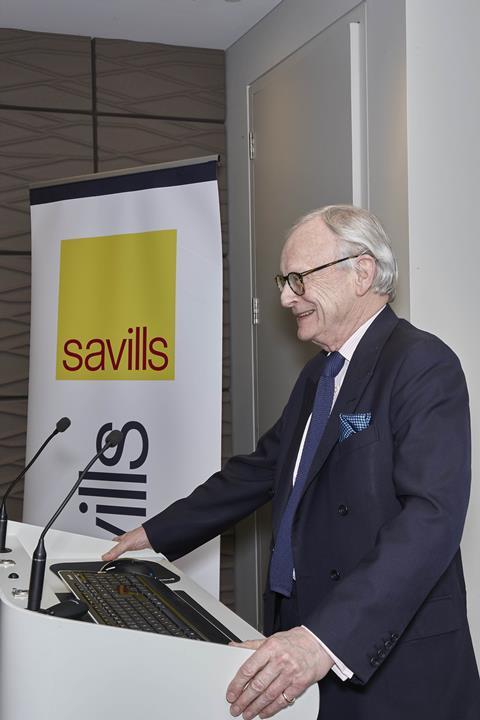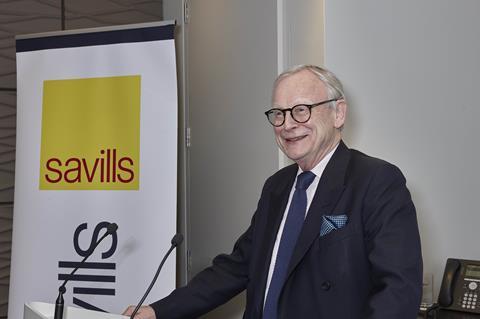Speaking at Property Week’s Spotlight on Logistics event in association with Savills and Tritax Symmetry, chairman of the Committee on Climate Change and former secretary of state for the environment Lord Deben discussed why the government has to act fast on the climate crisis, and the challenges the property industry will have to rise to going forwards.

I’ve worked in property all my life and the cry always is for certainty. So I had better tell you right from the beginning I’m not going to provide certainty – that is almost impossible in the world in which we live.
But I am going to try and give some indication of where government will go and what the pressures on government are, and how the property industry might react to it.
The first thing we have to recognise is the new government comes into a new circumstance which has been very powerfully redefined for it, because it comes in having voted for Britain to go to net 0 in its emissions by 2050.
Now the whole parliament did that for a very good reason. We have to. There is no way out of this. People are now realising that climate change is extremely serious and if you allow it to get to the level it’s getting to at the moment – because it’s set course for an increase in temperature all round of something like 3 degrees – then the effect of that on the human race is very significant indeed.
And that’s what the Paris agreement came to – the very first agreement that has ever happened with every nation signing up, it came to the agreement that it had to try and keep the growth of temperature down to something like 1.5 degrees. Because anything more than that had two real problems. One, it was very difficult to deal with. And two it didn’t know when the tipping point is. It could create very serious changes which we have no idea of because there is no doubt; there is no point in history in which things have changed as much as they have over the last 150 years.
Fast progress
There have been human beings on the earth for 900,000 years and it took us 850,000 years to domesticate the horse. And then when we domesticated the horse, for the very first time we could move faster than we could run. And then when you think about that, we moved no faster than the horse for 50,000 years. Nebuchadnezzar army moved at exactly the same pace as Wellington’s at Waterloo. And all that we talk about now has happened in 200 years. What has happened in 200 years is utterly amazing.

The background of what happened in the 850,000 years before, it is hugely different. If you remember from your science at school, you may remember the earth was too hot to support anything we call life until bushes and trees came out and drew the carbon out of the atmosphere. And then when they died they lay down and over thousands of years turned to coal. It’s not surprising that if that cooled the earth, that putting it back into the atmosphere, as we have been over the last 150/200 years, that what it does is warm the earth up. It is absolutely what happened originally but in reverse.
We are in this very serious position and it is a non-analogous position in the sense that if you dig down 800,000 years into the planet’s ice, which you can do (it’s rather like cutting down a tree and looking at the rings) you can see each year puts a new layer of ice on. And you can tell from the ice how cold it’s been and the difference is that the ice also has globules in and captures the air, so you can also find out how much carbon there was in the atmosphere.
And the facts are, if you look back 800,000 years, at no point has the temperature risen as hard or as fast as it has over the last 150 years. Nor has the amount of carbon in the atmosphere risen as it has. So today the temperature has risen to a level it has never been before in that distance of time, and the amount of carbon in the atmosphere, similar. It’s not the same as the ice ages and the warm periods – you can see those in the ice. But this is entirely different. That is why this is so serious. There is no knowledge of what happens. We don’t know anything, other than it is inexorably rising and that this is the hottest decade in history. Since the world became habitable.
You may have heard Attenborough talk about the climate “crisis” and it is important to see that it is a crisis and the government really has begun to recognise that.
10 years to put it right
The thing is that we are in the situation in which we are told by scientists that we have about 10 years to put this right. Britain has decided that it takes the lead in this in the structure of the climate change committee and the climate change act has given us that opportunity.
So when I said when Boris came in he was already fixed on some things. One was that he has to get to net zero by 2050, which means you have to do things now. But he’s also got to do it because the law says he’s got to do it. He has to do it by meeting the budgets which the committee of climate change which I chair set, and then parliament passes, and then they can’t be changed.
He has a situation where we’ve either met or will meethe 1st, 6th, 7th and 3rd carbon budget. But we will not get anywhere near meeting the fourth or fifth carbon budget unless he makes some very big changes, and he’s committed himself to do that.
There’s another reason he has to succeed and that is the last committee government committed to host the next meaning of the international party which had the Paris Agreement but is known as the Conference of the Parties, or COP [to be held in Glasgow this November].
This is the next most important COP because it’s this one in which nations are going to sign up to the further extended efforts about climate change. So the movement in the world is considerable.
There are just a few people who have not caught up with it. And it seems clear that Mr Morrison is even beginning to realise that perhaps, just perhaps, this might be something he has to pay attention to.
And in America of course very large number of states, huge numbers of cities and indeed most of the major companies are already doing this, they are already accepting that they too do have to be on board. So it’s against that background that you have to look and see what the government is going to have to do.
Property must be zero carbon
Property is going to play a very important part in this because it cannot reach its targets, it cannot reduce its emissions by a maximum so that it can do some offsetting to make a difference between zero and net zero, it cannot reach that unless it turns the whole of the property industry into a net zero industry.
Because when we talk about net zero there are certain things we can’t get rid of. Emissions. Some of them are historic so even in 2050 we’re going to have them. And some of them, for example in aviation, we don’t have an answer. We don’t yet know how we can fly airplanes without creating emissions.
So you have to find ways of sequestrating carbon. You have to plant trees. You have to make the soil more fertile so you can bring the carbon out of the atmosphere. When you look at what we have to do, the property industry becomes very central.
Those of you who are concerned with land value have to recognise that the land is going to be very crucial to this. We will be farming and sequestrating at the same time.
One of the terribly sad things is in Britain, as in much of the western world, the fertility of our soil because of modern farming methods, is decreasing considerably. It is not taking in the carbon that it once took. We can’t hit these targets unless we’re sequestrated.
If you look at the Committee on Climate Change’s advice to the government, it is quite clearly going to have to tackle the emissions from buildings. That means a whole range of things. First of all we’re going to have to build carbon neutral buildings. We’re going to have to have standards that are much higher than what we have now.
Secondly we have to reconstitute a lot of the buildings that we’ve got. There will be much less demolition and much more adaptation. We’re going to have to recognise that it’s not just a question of using less energy, it’s also a question of recognising that we’re going to have much hotter summers so we have to think very seriously about ventilation. And many of the constructions that we’ve done for the most vulnerable people are entirely inadequate for what is going to happen. We’re going to build we understand 60 new hospitals; they will have to be a totally different standard to anything we had before. Not only will they use little energy, they also have to be properly ventilated.
As you know, a significant number of people died because of the hot weather last year, and we’re going to get more of them. And we have to use less water because that is another problem we have. East Anglia is now officially classed as a semi-arid area. In the summer it’s short of water in a very extreme time. And yet we will have floods in the same place in the winter.
This is the change that’s taking place. We all know the difference. I live in the same place more of less that I have for 50 years. The spring comes two and a half weeks earlier now than it did when I moved in. You can see that – the buds come out before the pollinators so we are also mucking up our ability to grow things. So it’s very serious situation.
Four certainties
There are four certainties going forwards.
The first is the government will act. It won’t act as much as it ought to, it will have to be pushed, but it will act, and it will be much more extreme than people recognise because it has to.

The second certainty is, your industry is going to be right at the centre of it and you won’t be able to avoid it. Happily there are few housebuilders here, because they are going to learn the lesson of not having done what they ought to have done over the past years. They have a terrible reputation and they have not done what they should have done as an industry which is improving their standards regularly. And therefore the standard improvement is going to be very tough for them because they’re going to have to make huge changes by 2025. We’re building 200,000 houses a year which we’re going to have to retrofit which is what we’re doing at the moment – that is madness. It’s not a sensible position to be in.
Thirdly, the government is going to have to provide whereby people can move from fossil fuels. That will have huge changes in the way which we arrange things. The industry has to find a way through this.
The last certainty is that this will speed up. Because the problem with climate change is that it’s true, and therefore it gets worse. And there’s an awful lot of climate change in the system.
So however well we do, we’re going to get bad anyway. Extinction Rebellion and Greta Thunberg are just the beginning. People really recognise what a serious challenge it is, so for the industry property industry it becomes absolutely crucial that we get ahead of that. Do not think that by hanging back and hoping for the best and arguing that we’re going too fast, that somehow you won’t have to face up to the issues. We will. We have to do it more quickly than even I think.
Those are the four certainties. They are not comfortable certainties. But they are all there.
You are also in a very privileged position because if you get it right, we get it right. You are crucial. It’s not just that you have to do it or we won’t meet those targets. It’s that in doing it, you make it possible for us to lead the world into doing what is perhaps the most remarkable thing we could do. Which is to save ourselves.
We are responsible. When Greta says what she says about this generation having a responsibility because her generation will carry the cost – she is actually right. That’s right. Because we know. And when you know you have to act.
The problem is for Mr Trump is that he dare not know. That’s why he says it isn’t happening. He says we don’t know, it’s an argument, the science isn’t certain. Science is certain as science ever is.
The reason he doesn’t want it to be certain is that if it were certain in his mind then even he would have to see that he has responsibility.
We do at least have cross party acceptance that we have responsibility. We have cross party determination to act. Our problem is politicians very often find the actual doing much more difficult than the actual saying.
And so this is going to be a year and then succeeding years of turmoil as politicians are pushed and pulled into doing what they’re going to have to do. But at least we have the certainty that they will. Because it’s going to be worse next year. And the pressure is going to be greater next year.
So we are in the most remarkable and wonderful moment. Aren’t we lucky to be alive? Aren’t we lucky that we’re in this position, that we can do it? There’s something real to do that all of us can join in with. Even as old as I am, I’m thrilled that I am part of what can be done.
We can do it, but only if we do it. If we do it together. The property industry needs to recognise it has some particular work to do, because of the longevity of its product and the importance of its product to civilisation. By complimenting you I am reminding you of your responsibility. And I’m afraid challenging you, about the threats as well as the opportunities.
(In answer to a question on how the industry will be regulated on its carbon emissions)
Coming to battle
In the commercial sector there are a lot of people saying we won’t build enough commercial buildings [under regulations]. So first of all you have to recognise that the government would be very stupid if it didn’t put tougher and more insistent regulation on the commercial property sector.
Government hasn’t made up its mind of how it will regulate real estate, and there seem to be difficulties in both directions. The fact is, it isn’t properly regulated at the moment and government knows that, and they know the present standards are not being enforced. They know that, and therefore that will be a key part of what they are seeking to do. One of the things the industry ought to be doing itself is itself coming to battle not with problems but with solutions.
Come to the government and say “look this is the way to do it”, not, “I don’t want to do it”.
This is the way to do it because in a commercial industry you don’t want your competitor to get away with something you won’t get away with and decent companies like Savills and others are not going to get away with it. You don’t want cowboys; you do want the regulations to work.
It is open to you to make a difference. The government will want that advice and they will take it, because they know they have got to do something about making the regulations stick.






























No comments yet